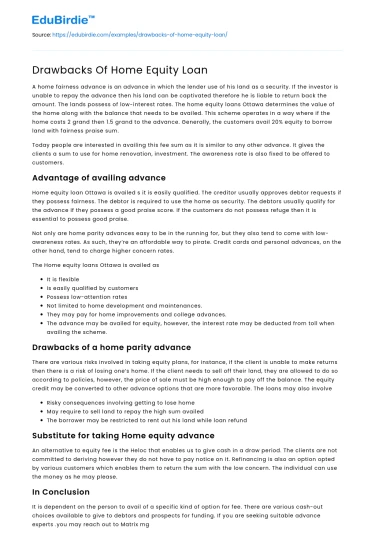Introduction
Home equity loans have become a popular financial tool for homeowners seeking to harness the value of their property for immediate financial needs. These loans, which allow borrowers to access a portion of their home's equity, can be beneficial for funding major expenses such as home renovations, education, or debt consolidation. However, despite their apparent advantages, home equity loans are fraught with potential drawbacks that warrant careful consideration. From the risk of foreclosure to fluctuating interest rates, these loans can introduce significant financial vulnerabilities. This essay explores the various disadvantages associated with home equity loans, providing a comprehensive analysis of their potential impact on financial stability. Through examining real-life cases and expert opinions, we aim to elucidate the less apparent risks involved, offering a balanced perspective that considers both the benefits and the inherent challenges of this financial option.
Risk of Foreclosure
One of the most significant dangers of obtaining a home equity loan is the risk of foreclosure. By using their home as collateral, borrowers expose themselves to the possibility of losing their property if they fail to meet the repayment terms. According to a report by the Federal Reserve Board, approximately 9% of home equity loan holders faced foreclosure proceedings during the housing crisis of 2008 (Federal Reserve, 2009). This statistic underscores the precarious nature of securing a loan against one's home. In real-life scenarios, individuals who experienced sudden job loss or medical emergencies found themselves unable to meet the repayment obligations, ultimately leading to foreclosure. The housing market collapse further exacerbated these challenges, as declining property values rendered many homeowners unable to refinance or sell their homes to cover outstanding debts.
Save your time!
We can take care of your essay
- Proper editing and formatting
- Free revision, title page, and bibliography
- Flexible prices and money-back guarantee
Moreover, the repercussions of foreclosure extend beyond the immediate loss of property. Foreclosure can severely damage one's credit score, making it challenging to secure future loans or even rental agreements. The emotional toll of losing a home can also have long-lasting effects on families and individuals, leading to psychological distress and instability. Therefore, while home equity loans may offer a temporary financial solution, the potential for foreclosure presents a substantial risk that cannot be overlooked. This risk is particularly pertinent for individuals with unstable income or those living in areas with volatile housing markets, where property values are subject to rapid fluctuations.
Fluctuating Interest Rates
Another critical drawback of home equity loans is the susceptibility to fluctuating interest rates. Many home equity loans, particularly home equity lines of credit (HELOCs), come with variable interest rates that can change based on market conditions. This variability can lead to unpredictable monthly payments, complicating financial planning for borrowers. For instance, during periods of economic instability or rising interest rates, borrowers may find their monthly payments increasing substantially, straining their financial resources. Such was the case during the late 2000s when interest rates spiked, leaving many homeowners struggling to keep up with their loan payments (Smith, 2010).
Fluctuating interest rates not only increase financial uncertainty but can also negate the initial cost-effectiveness of a home equity loan. Borrowers who initially secure low rates may find themselves paying much higher rates over time, thereby increasing the overall cost of the loan. Furthermore, the lack of transparency in how rates are adjusted can leave borrowers feeling vulnerable and uninformed. Financial experts often recommend that individuals considering a home equity loan should thoroughly assess their ability to withstand potential rate increases, ensuring they have a buffer to accommodate changes. Despite these precautions, the inherent unpredictability of interest rates remains a significant concern, particularly for those with limited financial flexibility.
Impact on Financial Stability
Home equity loans can also negatively impact overall financial stability. By increasing their debt load, borrowers may find themselves over-leveraged, with a significant portion of their income dedicated to servicing debt. This situation can limit their ability to save for future needs or emergencies, creating a cycle of financial dependency. In a study conducted by the Consumer Financial Protection Bureau, it was noted that individuals with high levels of home equity debt often struggled to maintain a balanced financial portfolio, leading to increased stress and reduced quality of life (CFPB, 2017).
The decision to leverage one's home equity should not be taken lightly, as it can also affect retirement planning. Older homeowners, in particular, may be tempted to access their home equity to supplement retirement income. However, this strategy can backfire if home values decrease or if they are unable to meet loan obligations. In such cases, the loss of home equity can significantly diminish the financial resources available during retirement, compromising long-term financial security. Financial advisors often caution against relying heavily on home equity as a retirement strategy, advocating instead for diversified investment portfolios that do not place undue risk on one's primary residence.
Conclusion
In conclusion, while home equity loans offer a convenient means of accessing funds, the associated risks and drawbacks must be carefully weighed. The potential for foreclosure, the uncertainty of fluctuating interest rates, and the impact on overall financial stability present significant challenges that should not be underestimated. By understanding these risks and implementing prudent financial strategies, borrowers can make informed decisions that safeguard their financial well-being. As the landscape of home financing continues to evolve, it is imperative for individuals to seek comprehensive financial advice and to consider alternative options that align with their long-term financial goals. Ultimately, home equity loans should be approached with caution, ensuring that the benefits do not come at the expense of one's financial security.






 Stuck on your essay?
Stuck on your essay?

